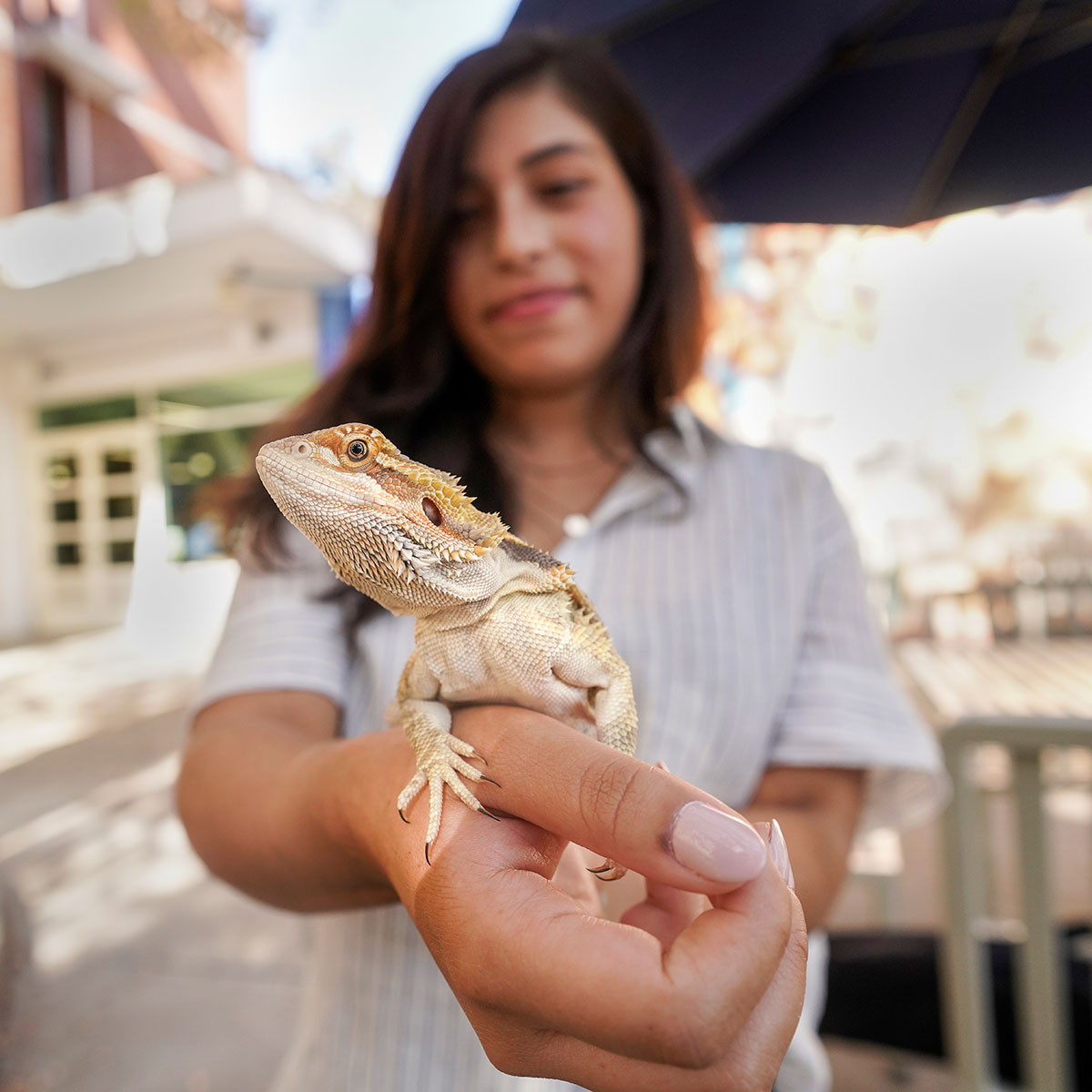
Animals on Campus
Dogs, cats, horses, lizards, birds. Meet some of the animals that make college life fun.
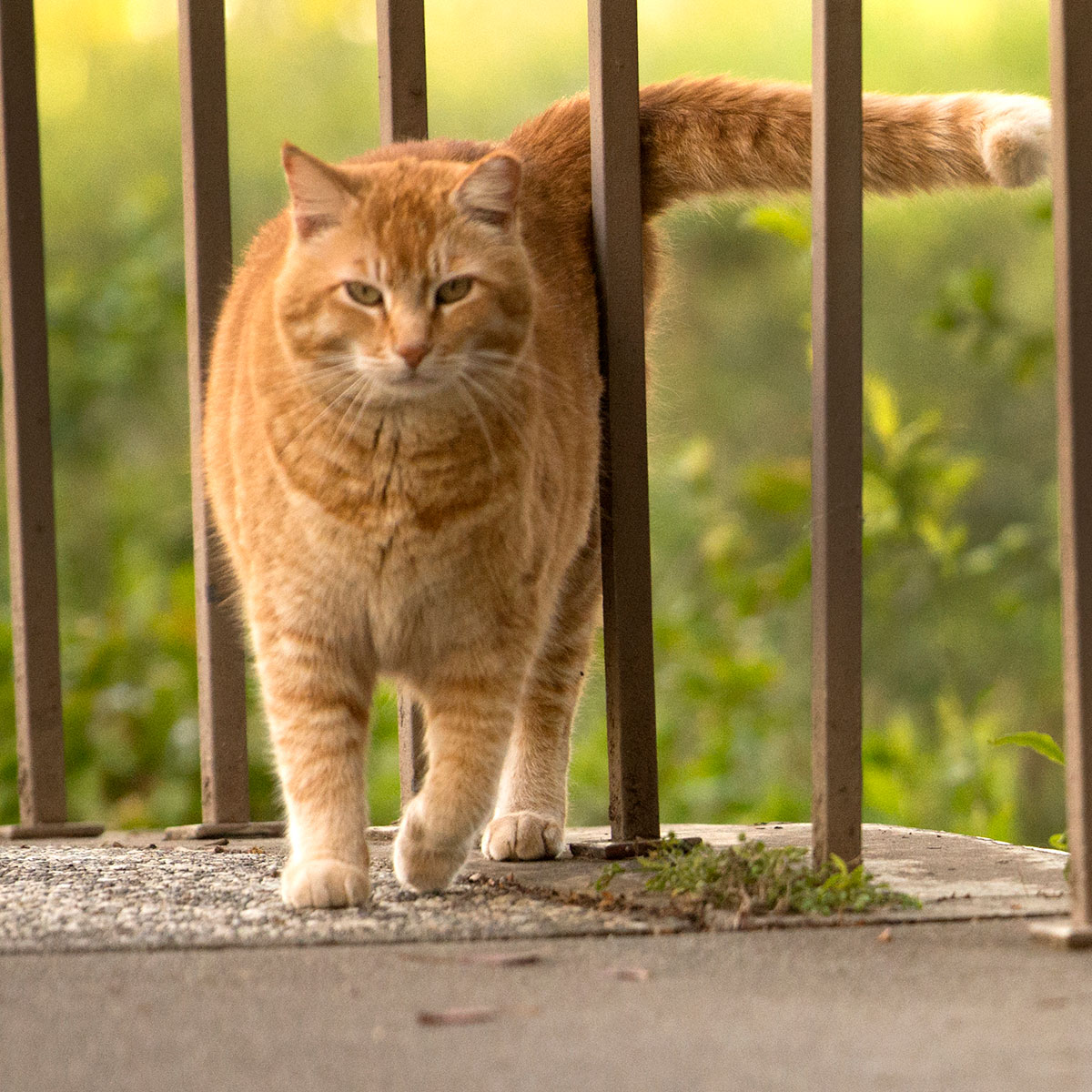
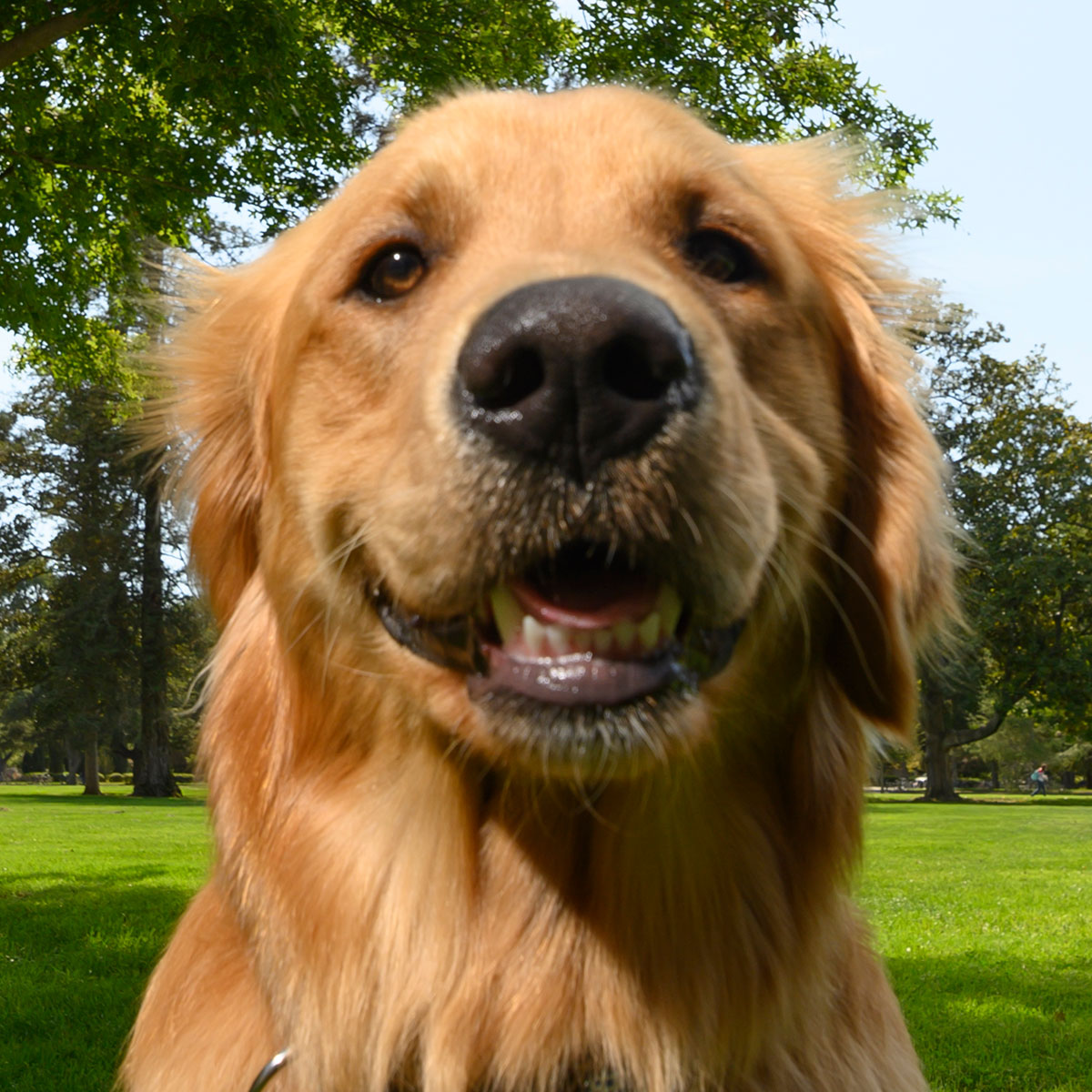
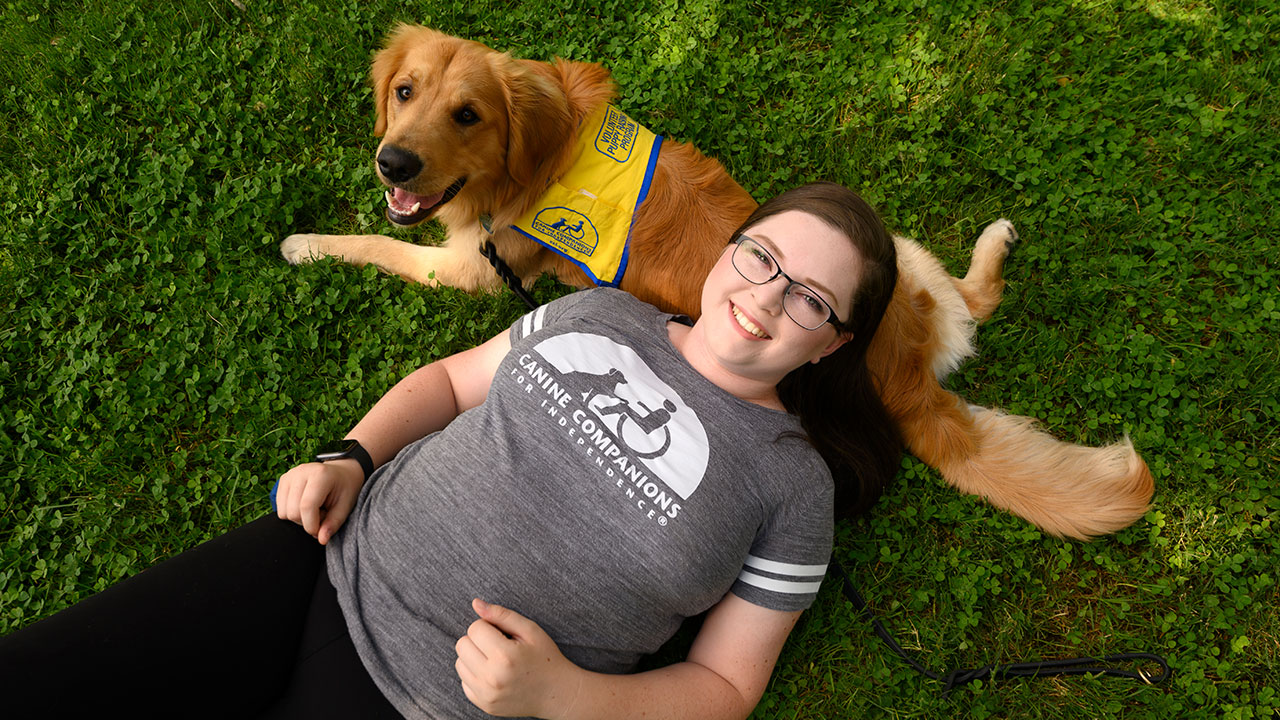
Gregory Urquiaga / UC Davis
Fergus
The Service Dog in Training
Elena O’Rourke is having fun and doing good. She is the founder and president of Davis Puppy Pals, a student-based service club that seeks to support service dog organizations, service puppy raisers and service dog handlers. Puppy Pals now has over 20 members, four of whom are currently raising puppies to become service dogs.
A fourth-year animal science major, O’Rourke was initially inspired by her animal volunteer work in high school. In her sophomore year of college, when she had moved out of the dorms and into a house, she started the club. Two years later, she’s training her second puppy — a golden retriever named Fergus. Fergus will learn more than 30 basic commands, in addition to socialization, before he goes on to professional training. These puppies are trained for service work, ranging from hearing dogs to skilled companions for children.
Saying goodbye is hard, but the sacrifice is worth it, she said. O’Rourke’s first puppy, Dizzy, is now a service dog for a woman with a degenerative muscle disease. “You put so much love and care into something and send that back out into the community.”
Plus, she gets to play with a lot of dogs. She said: “Just last week we had a pool party with 18 dogs!”
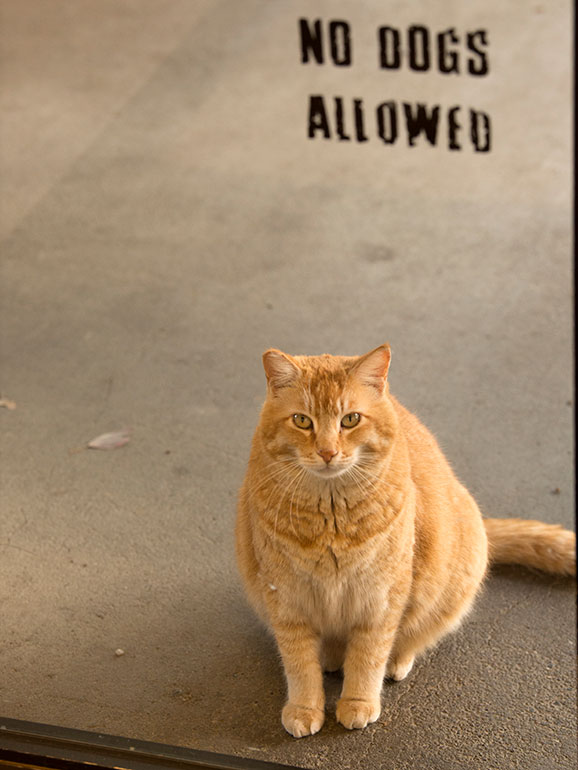
Karin Higgins / UC Davis
Cheeto
A Popular Local
Physics can be soul-shattering. That’s according to a sign that was posted this year outside the UC Davis physics building telling visitors about the facility’s resident cat, Cheeto. The sign said he offers emotional support to students and went on to encourage people not to overfeed him — as he may be obese and a bit of a beggar.
The building’s former office supervisor Tracey Brooks began feeding cats in the area in 2011 and cared for Cheeto until this summer. She recalled seeing at least eight cats early on, and most were adopted by students. Her co-worker Krystal Scruggs continues to care for the cats.
Visitors have been known to leave cat food and treats for Cheeto, an issue that led to the sign. To ensure the cats are healthy, physics professor Richard Scalettar works with student organizations and the vet school. Though it takes additional thought, Brooks said she, Scalettar and others have enjoyed helping the cats.
“One summer, there was a visiting student who wasn’t spending time with their classmates during breaks. But the building cats, especially Cheeto, became her friends,” Brooks shared. “We take care of the cats because they help anyone who needs a friend.”
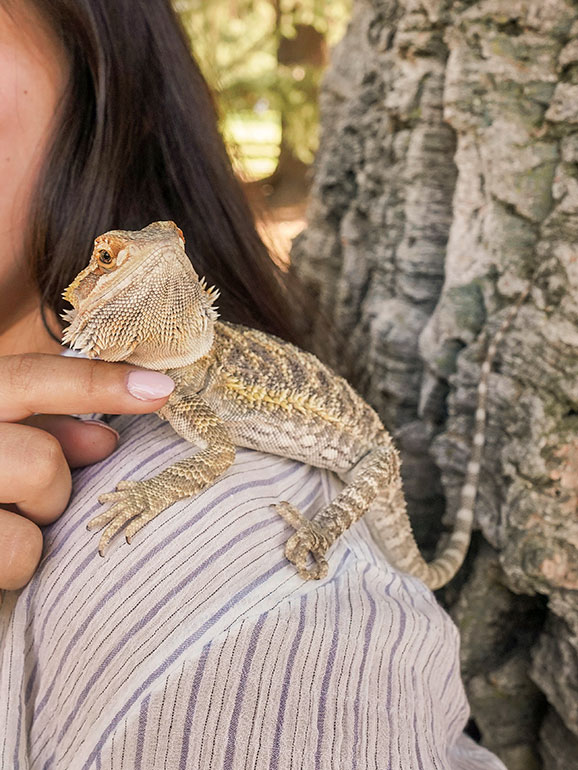
Walter, with her owner on campus
Karin Higgins / UC Davis
Walter
A Well-Traveled Reptile
Her summer travels have been documented via Instagram, from a walk in the UC Davis Arboretum to a stroll through The Grove in Los Angeles. But Walter isn’t your typical travel influencer. For one thing, she’s a lizard.
Walter’s owner is a third-year English student. She said the account, created in July, got a much bigger response than she had anticipated. “I didn’t think a lot of people would find it interesting,” she said, “but a lot of people really like her photos and comment.” In posts written from Walter’s perspective, they chronicle her adventures around UC Davis and West Hollywood.
Her owner got Walter from Petco five months ago and said she chose the name because it sounds mature and sophisticated. A month later she found out Walter is actually a girl. Her distinguished moniker seems to suit her, she said. “She’s pretty quirky. She has a very picky attitude. She doesn’t like her vegetables.”
Walter has been pictured all over campus. For one photo, Walter sat on a rock, but the lizard escaped into the rocks for 20 minutes before being safely captured. Despite the challenges, her owner said that Walter loves to come to campus. “She gets to explore UC Davis and hang out with me.”
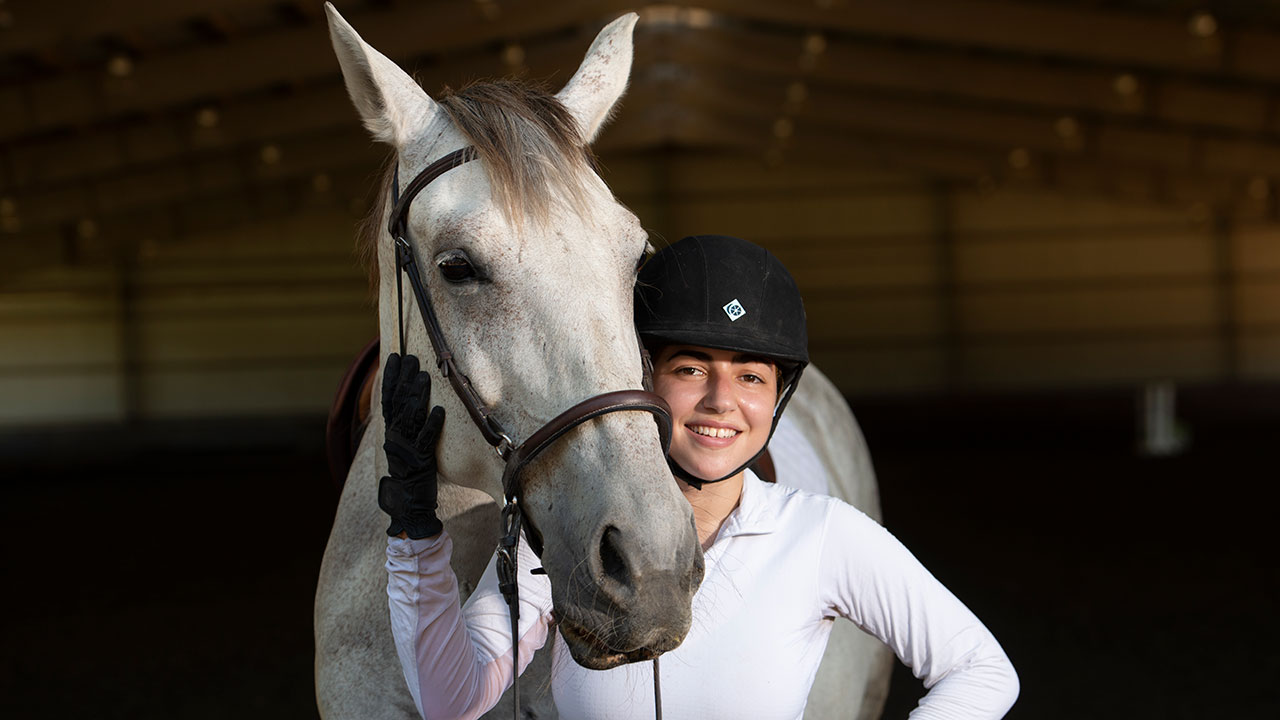
Gregory Urquiaga / UC Davis
Nina
A Beloved Boarder
When Margo Rosenbaum applied to college, one of her top priorities was to make sure her friend Nina could accompany her. This couldn’t happen at just any college, because Nina is a horse: a gray warmblood and Oldenburg mare. Rosenbaum, now a second-year student majoring in communication, said, “That was the dream. I didn’t want to have to sell her when I was going off to college so I was going to somehow make it work no matter where I went.”
Nina now boards at the UC Davis Equestrian Center. Rosenbaum spends one to three hours every day riding and spending time with Nina.
Rosenbaum started riding horses when she was 4. She got Nina as a high schooler, and the duo competed in hunter-jumper shows. Now, the two compete on the UC Davis Hunter Jumper Team.
She said that having Nina close is a great way to meet people with similar interests. Nina lives in a pasture with five other horses, and Rosenbaum knows all of their owners.
And how does Nina feel about life at UC Davis? “I think she likes college,” said Rosenbaum. “Wherever I go once I graduate, she’ll come along with me.”
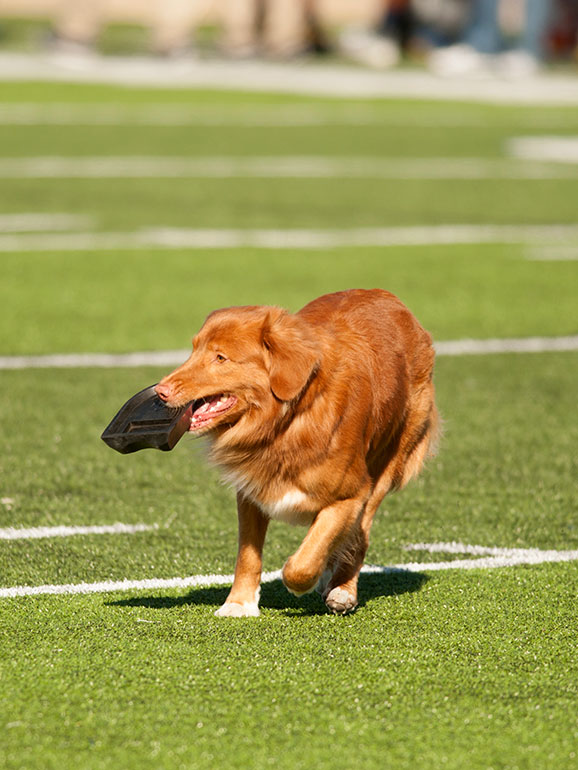
Karin Higgins / UC Davis
Pint
The Tee Retriever
Pint has been a fixture on the UC Davis football field since 2012. The 8-year-old Nova Scotia duck tolling retriever fetches the team’s kickoff tee. This year though, he’s taking a break while his owners, Danika and Mike Bannasch, are on sabbatical in Switzerland. The only chance to see Pint do his thing will be at this year’s Homecoming game on Oct. 12.
The Bannasches got involved in the football games to bring awareness to the School of Veterinary Medicine, where she is a professor and he is a clinical trial coordinator. It’s also the place where Pint’s grandmother underwent lifesaving treatment.
According to Danika Bannasch, Pint loves swimming and retrieving. “Pint loves to work and is a pretty serious, focused dog,” she said.
While Pint’s gone, the Fetch Like Pint challenge invites fans to submit videos of their animals doing their best Pint impressions for their chance to be featured on the videoboard this season.
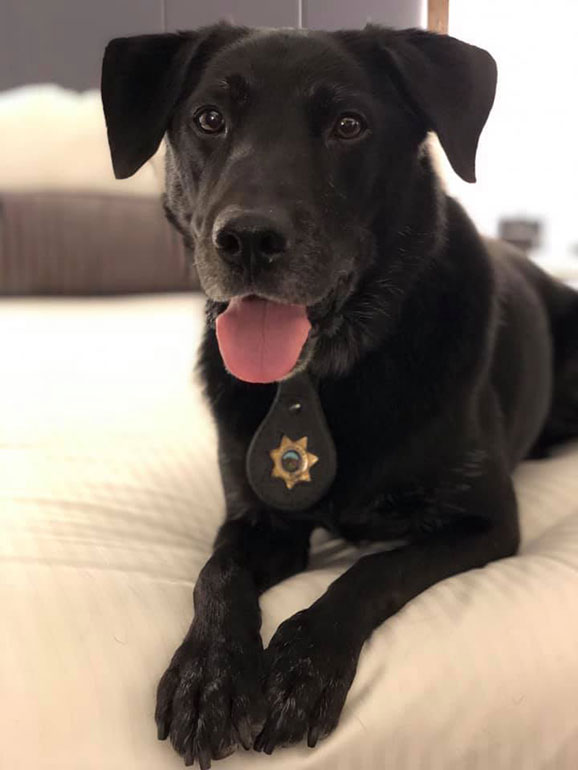
Courtesy
Charlie
The Skilled Sniffer
One of the most recognizable faces on the UC Davis police force is four-legged. Charlie, the 8-year-old black lab and border collie mix, was rescued locally through Labs 2 Love and eventually adopted by the UC Davis Police Department. Originally part of an outreach program, Charlie is the campus explosive detection dog, and he now works patrol shifts. His social media accounts remain active, keeping the community updated on his police work.
Where Charlie goes, so does his handler, Officer Vincent Kwong. “I don’t have any kids but I kind of equivocate him to a kid,” explained Kwong. “He’s basically my roommate.” The opportunity to take care of Charlie drew Kwong to the position five years ago, he said. Excellent communication between them is essential, so weekends are spent conducting detection training. Charlie is commonly called in for preventative explosive sweeps prior to high-profile speaker visits or events on campus. Now Charlie and Kwong are inseparable. “Separation anxiety is horrible with him.”
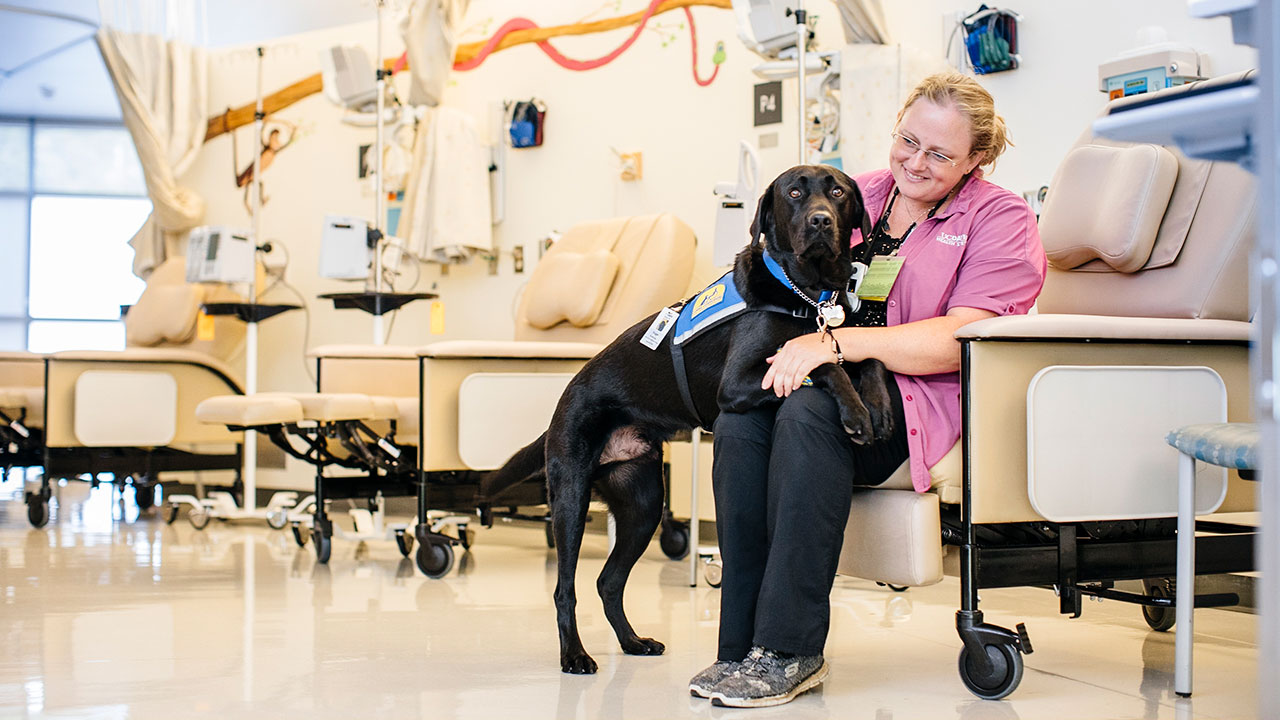
Courtesy
Huggie
A Calming Presence
The nurses in the Pediatric Infusion Center at the UC Davis Comprehensive Cancer Center recognize Huggie as a familiar face when he pads down the halls and joins them on breaks — he’s their co-worker. For them and Jennifer Belke — the retriever mix’s handler — he’s an important part of their routine.
Three-year-old Huggie has been a team member since May 2018 and helps provide care to pediatric patients. Canine Companions for Independence bred, trained and provided Huggie for free. As a facility dog, he is distinct from a therapeutic animal.
“Therapeutic animals are your own personal pet, and they only know five basic commands,” Belke explained. Facility dogs, by contrast, are licensed through a company until retirement, and ownership only passes to their foster parents once the dogs retire. To work in a hospital, they need extra veterinary visits, extra bathing, and more extensive care of their dog beds, collars and leashes. They’re also taught more than 40 commands.
Huggie has a comforting presence. “A couple kids swear that having him in the chair makes them more brave,” said Belke.
Belke said she treasures the opportunity to work with Huggie to provide care — despite her allergy to dogs.
“He provides something I cannot provide as a human. There’s a time that he can curl up in a bed, and kids relax, parents calm down and start to cry,” she said. “And I can’t do that — Huggie really just fills a void.”
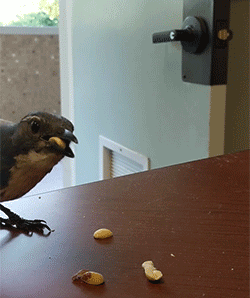
… And Some Wildlife
Behind the eucalyptus grove, on the second floor of Hoagland Hall, Eric Kvigne, associate vice chancellor of Safety Services, prepares for some visitors. During the warmer months, Kvigne is greeted by small groups of blue jays — who come inside his office for peanuts — sometimes as often as a couple of times a day. “They just come flying in and pick them up,” Kvigne said, pointing to the building’s breezeway outside his workspace. This ritual was established several years ago, and Kvigne now keeps a jar of peanuts above his desk for the blue jays. Kvigne chuckled, remembering the impact the birds have had around the office. “Sometimes it would be a problem because when the door is open and someone’s walking by from that direction,” he said, pointing to the offices next door to him, “they’re just walking down the breezeway and suddenly a bird comes flying across.” They also serve as a reminder of the food chain. Pointing to the eucalyptus trees, Kvigne said, “We have nesting hawks out there who think the blue jays taste very good.”
